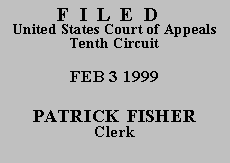

| RICHARD A. DREHER,
v.
STEVE HARGETT |
|
Before BRORBY, EBEL, and
LUCERO, Circuit Judges.
After examining the briefs and appellate record, this panel has determined
unanimously that oral argument would not materially assist the determination of
this appeal. See Fed. R. App. P. 34(a)(2); 10th Cir. R. 34.1(G). The case is
therefore ordered submitted without oral argument.
Appellant Richard A. Dreher, Sr., a pro se state inmate, appeals the district court's dismissal of his habeas petition filed pursuant to 28 U.S.C. § 2254 and requests a certificate of appealability. The district court dismissed his petition with prejudice because it determined his § 2254 petition to be time-barred by the Anti-Terrorism and Effective Death Penalty Act. We grant his request for a certificate of appealability and remand his petition for a determination of the timeliness of its filing.
We disagree with the district court that Mr. Dreher's petition is untimely and barred by 28 U.S.C. § 2244(d). Mr. Dreher's conviction became final June 15, 1995, and he did not file a direct appeal. On February 14, 1997, Mr. Dreher filed an application for post-conviction relief in the state trial court, which denied his application on March 10, 1997. On May 8, 1997,(1)
the Oklahoma Court of Criminal Appeals dismissed his appeal as untimely. Because his conviction became final before April 24, 1996, the deadline for filing Mr. Dreher's § 2254 petition was April 23, 1997. See Hoggro v. Boone, 150 F.3d 1223, 1226 (10th Cir. 1998). Because Mr. Dreher untimely filed his appeal to the Oklahoma Court of Criminal Appeals,(2) we toll the limitation time only for the period the state post-conviction application was before the state trial court, i.e., from February 14, 1997 to March 10, 1997, or twenty-four days. Adding twenty-four days after April 23, 1997, the resulting deadline for filing the petition fell on Saturday, May 17, 1997. Under Rule 6 of the Federal Rules of Civil Procedure, the last day of computation for a filing date shall not be included if it falls on a Saturday or Sunday. Fed. R. Civ. Proc. 6(a). Consequently, the deadline for filing the habeas petition fell on Monday, May 19, 1997. Mr. Dreher executed his § 2254 petition on May 19, 1997, and the federal district court clerk file-stamped it on May 27, 1997. Nothing in the record indicates when Mr. Dreher gave the petition to prison officials for mailing. As the district court recognized, the date Mr. Dreher gave his petition to prison officials for mailing could affect the timeliness of his filing. See Hoggro, 150 F.3d at 1227 n.3. Because the district court incorrectly found the petition untimely, even if Mr. Dreher gave it to prison officials on the date of execution May 19, 1997 it also incorrectly found it "unnecessary for the parties to provide the mail log" maintained by the prison for outgoing mail. Finding the district court erred in calculating the filing deadline, and that a determination must be made as to the date prison officials received the petition for mailing, we grant Mr. Dreher's request for a certificate of appealability and REMAND to the district court for a determination of the timeliness of Mr. Dreher's petition in conformance with this Order.
Entered by the Court:
WADE BRORBY
United States Circuit Judge
*. This order and judgment is not binding precedent except under the doctrines of law of the case, res judicata and collateral estoppel. The court generally disfavors the citation of orders and judgments; nevertheless, an order and judgment may be cited under the terms and conditions of 10th Cir. R. 36.3.
1. The district court incorrectly states the dismissal occurred May 18, 1998. This discrepancy, however, does not affect the outcome.
2. Section 2244(d)(2) requires a court to subtract time only for the period in which petitioner "properly filed" the state post-conviction application.